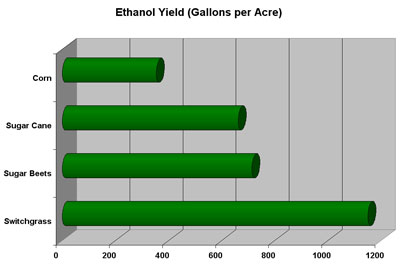New Nebraska ethanol plants threaten Kansas water supplies
New Nebraska ethanol plants threaten Kansas water supplies
mongabay.com
September 5, 2007
|
|
Ethanol production is threatening water supplies in the American Midwest reports the Wall Street Journal.
The paper presents the water conflict between corn growers in Nebraska and Kansas owners of underground water wells on the Republican River as an example. As corn acreage expands to meet demand from the booming ethanol market, water needs swell.
“Everywhere farmers grow corn, water is becoming a major concern as ethanol plants ramp up production at a startling rate and the threat of drought is ever-present,” writes Joe Barrett. “A 50-million gallon ethanol plant might use about 150 million gallons of water to make fuel…. That’s why many water experts are more concerned about farmers growing more thirsty corn to meet the extra demand from ethanol than they are about the water used by the distilleries themselves.”

|
Nebraska is still using more than its share of the river’s water allowed by the law but four new ethanol plants (one under construction, one close to construction, and two planned) will only increase pressure on tight water supplies.
“I guess my question is, will the farmers get enough water?” asked Justin Kent, president of Olympus Energy Group, developer of the planned 55-million-gallon plant. “I know we’ll get enough water for our one plant, but if farmers don’t get enough water that’s a big problem.”
Related articles
With Corn ethanol more costly than oil, is Jatropha a better biofuel?
(8/24/2007) Jatropha may be a more economic biofuel than corn-based ethanol, reported the The Wall Street Journal on Friday, citing research from Goldman Sachs. Analysis of the bioenergy market suggests that jatropha, which can be grown in variable conditions with little water or fertilizer, could be used to produce a barrel of fuel for around $43, less than the cost of sugar cane-based ethanol ($45 per barrel) or corn-based ethanol ($83 per barrel) currently favored in the United States. Further, because jatropha isn’t edible and grows on land unsuitable for foods crops, its expansion doesn’t compete with traditional food production.
Corn ethanol is not the solution to energy independence
(7/18/2007) A new report claims that corn ethanol will not significantly offset U.S. fossil fuel consumption without “unacceptable” environmental and economic consequences. The report, The Rush to Ethanol: Not all BioFuels are Equal, reviews recent scientific studies on the environmental and economic implications of replacing fossil fuel production with corn ethanol. It found that corn ethanol is neither realistic nor productive source of biofuel.
Ethanol may be greener but have higher health cost
(4/18/2007) Widespread burning of ethanol as fuel may increase the number of respiratory-related deaths and hospitalizations relative to gasoline, according to a new study by Stanford University atmospheric scientist Mark Z. Jacobson. The report comes as mounting environmental concerns cloud the benefits of using ethanol as a green alternative to fossil fuels.
JOE BARRETT (2007). How Ethanol Is Making The Farm Belt Thirsty. Wall Street Journal September 5, 2007; Page B1